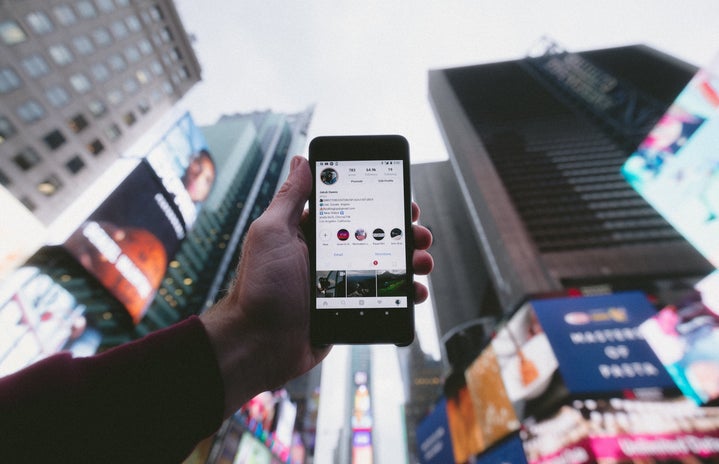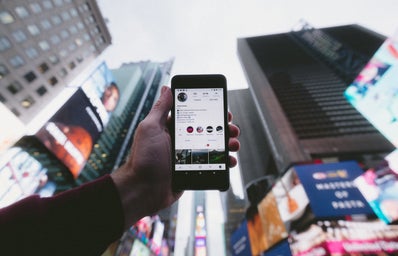In today’s society, it is very uncommon to meet someone who doesn’t use social media. It’s how we stay in touch with friends and family, make work connections and begin new relationships. Children are being exposed to technology at earlier ages which are causing younger generations to be dependent on the handheld gadgets we seem to struggle without. So with all of the pros that come with social media and phone applications, does the good outweigh the bad?
It’s no small fact that anxiety, depression and other mental health disorders are becoming increasingly more common in teens and young adults. The question is, does social media have a part to play in this? According to the Child Mind Institute, it does. Social media allows each of us to communicate with the touch of a button instead of allowing us to acquire the social skills that come with face to face contact. Why would anyone deal with the awkwardness the comes with talking in person when they can Snapchat someone and avoid the stress? Because of this, teens are less prepared when it comes to public speaking and are left feeling anxious when communication is involved.
The Royal Society for public health also conducted a study that found that those who use social media frequently are often left suffering from “feelings of anxiety, depression, poor body image, and loneliness.” When we are constantly seeing ads that tell us how to achieve the perfect body, clearer skin, softer hair and more, is it any surprise that younger people— especially females— are left feeling like their body isn’t what society wants? Facebook and Instagram are both guilty of this with advertisements that are set to target certain age groups and genders. Teenagers especially are left constantly comparing themselves to the models that show up on their screens and then feel dissatisfied with their appearances.
However, it’s not just the models in campaigns that we compare ourselves to, it’s also our peers. Every day is a constant contest to see who can get the most likes, who has the most followers or who has the most comments. When people upload to their Snapchat stories, they feel compelled to see how many people have viewed their photo. The average person will spend over five years of their life on social media, according to a study by influencer marketing agency Mediakix. Compare this to the one year and three months that we will spend socializing with our friends and family.
Every day we scroll through our feeds and compare ourselves to the attractive people on our timeline, wondering how we can be more like them. Young adults are so preoccupied with posting the perfect photo that we often don’t even post the original, we have to crop, add filters and do whatever it takes to make the image “perfect.”
Teens take the trophy when it comes to the most hours per day spent on social media, according to Social Media Today. On average, young adults spend about nine hours each day scrolling through our phones. How does this affect us? Consider all of the real-life interactions that this takes away from. It’s an instinct for us when we are bored, we reach for our phones. There are very few chores that we are unable to complete without taking a break to check our phones, whether it’s homework, cleaning or other daily tasks.
Humans are social creatures, and with all of our apps taking away from our face to face contact, we are left feeling isolated and detached. So with all of the negative emotions that we are aware social media plays a part in, why is it so hard to quit?
Studies show that the reason we reach for our phone, open an app immediately after closing it and are unable to disconnect is because of FOMO (fear of missing out). If we were to take the break that we need from social media for a good period of time we would constantly be concerned with what we’re missing. Yes, we do need a break from Snapchat, but is it worth losing our streaks? Yes, we do need a break from Instagram, but what if you miss finding out important gossip?
As of recently, teens don’t just have one Instagram account, many people now have two, an “Insta” and a “Finsta,” or fake Instagram. This means double the news feeds that people check when they open the app, double the follower count to worry about and double the anxiety about what to post. This means even more time spent on Instagram and even more mental health risk. Teens are known to stay up extra hours each night to check social media before bed, leading to less sleep, a decrease in productivity and their schoolwork and social lives are left to suffer.
We know the impacts that social media has on our lives and we know why it’s difficult for us to disconnect, so how do we disconnect anyway? According to Lifehack, there are many ways we can practice unplugging from technology. One tip that they suggested was to eliminate social media for one hour before you fall asleep and for one hour after you wake up. This will help you to start and end your day without a phone and will even lead to you feeling like you don’t need to check it throughout the day. It’s also important to reserve time for face to face interactions, whether it’s time with friends, family or romantic relationships. Establishing real-life connections is a great way to improve mental health and disconnect from our devices.
I also recommend that people take the time to enjoy their hobbies without documenting them. When going on a hike, to the beach, to a concert, etc., refrain from taking pictures as much as possible. Instead, try to live in the moment and focus on enjoying what is there in front of you. Don’t worry about what you will show to people, all that matters is that you’re enjoying life. Set aside time where you are phone-free, this is the first step towards feeling like you don’t need social media. Enjoy a book or movie, go shopping and once you are feeling confident you can then check your phone in moderation. As long as we don’t make it into a bad habit, social media doesn’t have to be bad. Young adults just have to make sure that they understand that what’s happening in the real world is more important than what’s happening on our devices.


